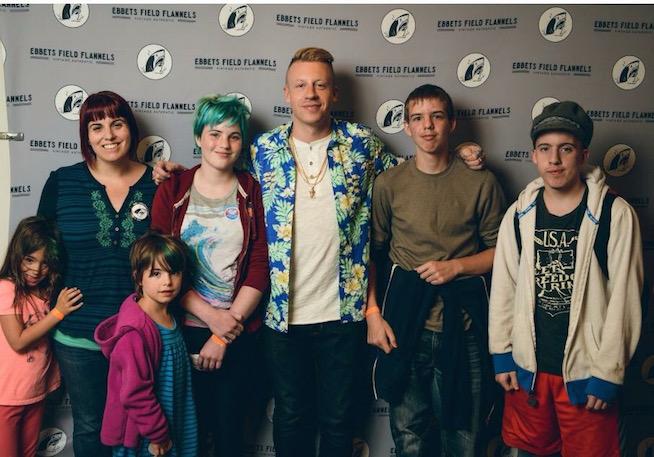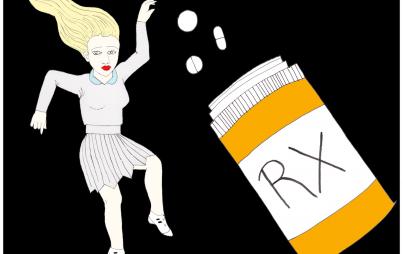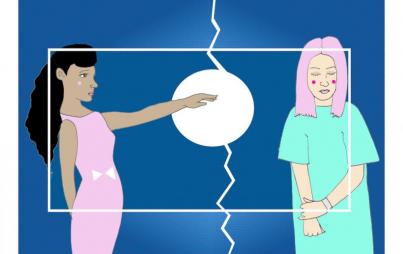
The author meets Macklemore.
For many years, I was the constant in my ex's life. I took care of him, much like I now take care of my children. As much as I didn't want to take on his problems, I felt trapped by my love for him. I didn't want to enable him, but I also couldn't allow him to fail without destroying our home, our finances, and even our marriage.
I'll admit that I have a somewhat unhealthy obsession with Macklemore. I've seen him perform twice and I've even waited in line for four hours to meet him. I'm a white girl living in Seattle, so my Macklemore obsession is pretty much a prerequisite.
That said, as much as I love Macklemore's music (social justice and gay rights? Yes please!), I also relate to many of his struggles, including his longstanding battle to remain clean and sober. In fact, when I read that he had relapsed (again), I full on ugly-cried.
As absurd as it sounds, one of my first impulses was to write an article to Macklemore himself. I wanted to warn him that his addiction will destroy the family he is building with his fiancée and new baby. I wanted to remind him that he will never kick his addiction until he delves into the psychological reasons he drinks — after all, studies show that addiction treatment is dramatically more successful when combined with an appropriate mental health evaluation and treatment. But, above all, I wanted to implore him not to try to do this alone. He has nearly unlimited resources, and I wanted to beg him to check himself in to rehab instead of continuing to go at it alone.
As I churned through these thoughts, I began to recognize a familiar pattern. Even now, six years after I left my alcoholic husband, my first instinct was still to take on someone else's addiction. So many years later, a part of me still believes that it's my job to save an addict from himself. Even if that addict is a famous singer who has family, friends, and probably even a staff of professionals to help him through his recovery.
I have written before about my experience as the wife of a (mostly) untreated alcoholic. My life with my ex-husband was built on quicksand, and punctuated by chaos. Although he managed to remain sober during the lengthy period of time it took to conceive our twin daughters, and even through most of my pregnancy, he began to drink again when I was admitted to the hospital for six weeks before their birth. Afterwards, he, like Macklemore, viewed his newborn daughters as his reason and motivation to remain sober, and during his two months of paternity leave he was a model father: He changed diapers, fed babies, and even kept me supplied with snacks and encouragement as I struggled to breastfeed two preemies. Those early months were as idyllic as life with twin newborns can be, until the day he went back to work and his co-workers took him out to "celebrate." That one night was all it took to unravel months of sobriety, and my ex has spent much more time drunk than sober in the seven years since.
For many years, I was the constant in my ex's life. I took care of him, much like I now take care of my children. As much as I didn't want to take on his problems, I felt trapped by my love for him. I didn't want to enable him, but I also couldn't allow him to fail without destroying our home, our finances, and even our marriage. I set boundaries and limits, but he immediately violated them.
It wasn't easy to leave. My ex and I had been together our entire adult lives, and we had twin infants. I remember feeling as if I simply couldn't survive without him. If addiction is a disease, it also felt like I was abandoning him to it. "What kind of wife leaves a husband with an illness?" I asked myself. I know the answer now: The kind of wife who values and respects herself enough not to allow herself to be treated like that.
In the years since our daughters were born, my ex has dated many women. All or at least most of them tried to help him, and for awhile I kept trying to help him, too. But nothing ever worked — he flirted with sobriety many times, but never managed to commit. His relationships crumbled and eroded, and he hasn't seen those little girls who were once his reason not to drink for more than a year now.
Not that long ago, my ex contacted me to tell me that he was facing homelessness. For weeks, I asked myself what I would tell my daughters someday if they asked me why I allowed their father to live under a bridge, if it came to that. Eventually, I knew that I would tell them that sometimes doing the right thing feels terrible, but it's still the right thing to do. For me, for them, and even for him.
I don't know what it's like to be an addict. I don't keep alcohol in my house out of habit, even after all of these years, and even the rare cocktail I have with a nice dinner out feels illicit. I guard myself against the prospect of an addiction that doesn't exist because I have watched it destroy a man. I refuse to allow it to lay claim me, too.
What I do know is what it is like to be the wife of an addict, and those years taught me to claim responsibility for addictions that aren't my own. Thankfully, while that is still my first instinct, I have come far enough now to pause and remind myself that I am no one's caretaker. I am not responsible for my ex-husband's addiction, and I am certainly not responsible for Macklemore's.
There is no amount of love or logic that will conquer an addiction. My life is better for having known my ex, but it's also exponentially better for having left. I didn't know that six years ago, when I was still awash in the misery and despair of living with an addict, but I know that now. And, as Macklemore would say, that's "a damn good place to start."








